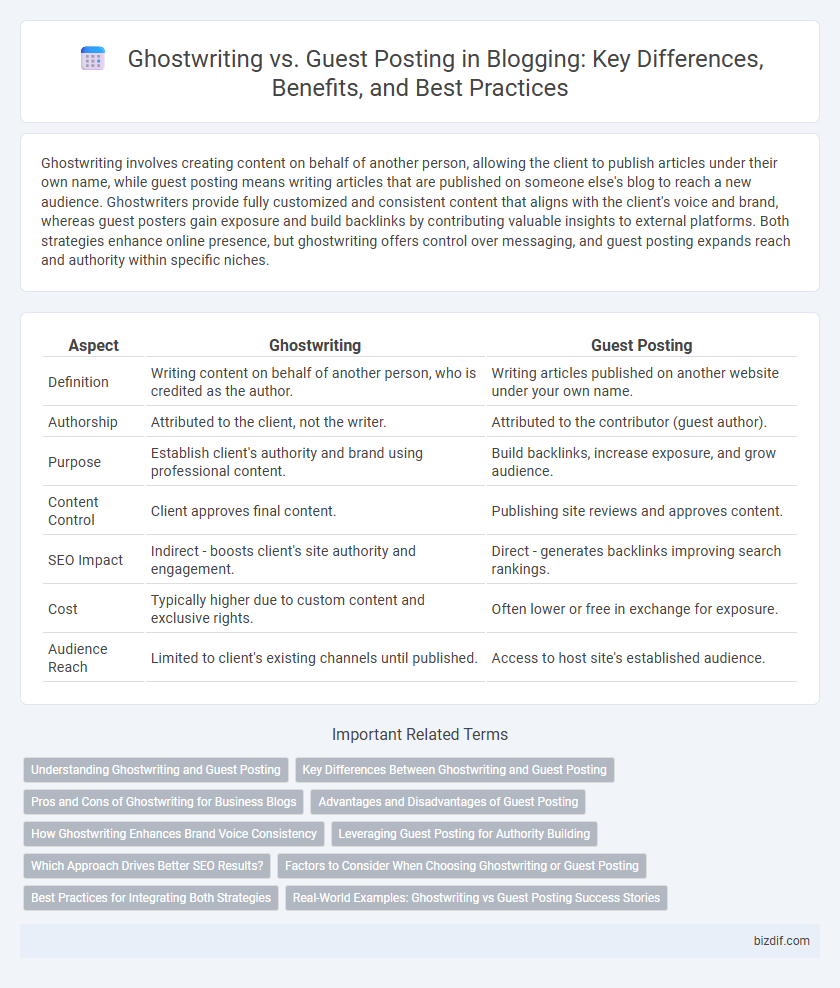Ghostwriting involves creating content on behalf of another person, allowing the client to publish articles under their own name, while guest posting means writing articles that are published on someone else's blog to reach a new audience. Ghostwriters provide fully customized and consistent content that aligns with the client's voice and brand, whereas guest posters gain exposure and build backlinks by contributing valuable insights to external platforms. Both strategies enhance online presence, but ghostwriting offers control over messaging, and guest posting expands reach and authority within specific niches.
Table of Comparison
| Aspect | Ghostwriting | Guest Posting |
|---|---|---|
| Definition | Writing content on behalf of another person, who is credited as the author. | Writing articles published on another website under your own name. |
| Authorship | Attributed to the client, not the writer. | Attributed to the contributor (guest author). |
| Purpose | Establish client's authority and brand using professional content. | Build backlinks, increase exposure, and grow audience. |
| Content Control | Client approves final content. | Publishing site reviews and approves content. |
| SEO Impact | Indirect - boosts client's site authority and engagement. | Direct - generates backlinks improving search rankings. |
| Cost | Typically higher due to custom content and exclusive rights. | Often lower or free in exchange for exposure. |
| Audience Reach | Limited to client's existing channels until published. | Access to host site's established audience. |
Understanding Ghostwriting and Guest Posting
Ghostwriting involves creating content on behalf of another individual or brand who is credited as the author, often utilized by busy professionals to maintain an active blog presence without personally writing each post. Guest posting consists of contributing original articles to external blogs or websites, allowing authors to reach new audiences and build backlinks that enhance SEO. Both strategies are essential for expanding online influence, with ghostwriting prioritizing content ownership and guest posting emphasizing content distribution across platforms.
Key Differences Between Ghostwriting and Guest Posting
Ghostwriting involves creating content on behalf of another person who is credited as the author, ensuring the writer remains anonymous, while guest posting entails contributing articles to another website with the writer's name prominently displayed. Ghostwriters tailor content to match the voice and style of the credited author, often working under strict confidentiality agreements, whereas guest posts aim to build the writer's personal brand and SEO authority through visible bylines. The primary difference lies in ownership and attribution: ghostwriting transfers authorship rights to the client, whereas guest posting establishes authorship recognition for the contributor.
Pros and Cons of Ghostwriting for Business Blogs
Ghostwriting for business blogs offers the advantage of consistently producing high-quality, professionally crafted content that enhances brand authority and saves time for busy executives. However, it may result in a lack of authentic voice, potentially reducing reader engagement and credibility if not managed carefully. Businesses must weigh the benefits of expert content creation against the risk of losing personal connection with their audience.
Advantages and Disadvantages of Guest Posting
Guest posting offers the advantage of expanding your reach by tapping into established audiences, which can enhance brand visibility and generate quality backlinks for SEO. However, relying on guest posting may consume significant time due to content negotiation and adherence to host guidelines, potentially limiting creative control. While guest posting boosts authority through association with reputable sites, inconsistent posting schedules can hinder building sustained audience engagement.
How Ghostwriting Enhances Brand Voice Consistency
Ghostwriting enhances brand voice consistency by ensuring all content reflects the same tone, style, and messaging aligned with the brand's identity. Professional ghostwriters deeply understand the brand's values and audience, producing seamless content that reinforces trust and recognition. This consistent brand voice across various platforms strengthens audience engagement and solidifies brand authority.
Leveraging Guest Posting for Authority Building
Guest posting enables bloggers to leverage established platforms for authority building by showcasing expertise to new, relevant audiences while earning valuable backlinks. Unlike ghostwriting, guest posting provides public recognition, enhancing personal or brand credibility in the niche. Consistent guest contributions on high-authority sites accelerate trust and organic traffic growth, solidifying thought leadership in the blogging community.
Which Approach Drives Better SEO Results?
Ghostwriting enhances SEO by producing original, high-quality content directly attributed to the main website, increasing keyword relevancy and domain authority. Guest posting boosts SEO through backlinks from reputable external sites, driving referral traffic and improving search rankings. An integrated strategy combining ghostwriting's content control and guest posting's link-building often yields superior SEO outcomes.
Factors to Consider When Choosing Ghostwriting or Guest Posting
Choosing between ghostwriting and guest posting depends on goals such as brand control, content authenticity, and audience engagement. Ghostwriting offers consistent voice alignment and confidentiality, while guest posting provides external credibility and link-building opportunities. Budget constraints, desired content ownership, and targeted SEO outcomes are crucial factors influencing the decision.
Best Practices for Integrating Both Strategies
Combining ghostwriting and guest posting leverages the strengths of both strategies to enhance content reach and credibility. Best practices include ensuring consistent brand voice across ghostwritten articles while selecting authoritative blogs for guest posting to maximize audience engagement. Strategic coordination of content themes and publication schedules optimizes SEO benefits and solidifies industry expertise.
Real-World Examples: Ghostwriting vs Guest Posting Success Stories
Ghostwriting success stories include renowned figures like Michelle Obama, who used ghostwriters to craft compelling memoirs with authentic voices, leading to best-sellers and widespread acclaim. Guest posting examples feature influential bloggers like Neil Patel, whose strategic contributions on popular marketing platforms significantly boosted his personal brand and website traffic. Both strategies demonstrate powerful, results-driven approaches to content creation and audience expansion in the blogging world.
Ghostwriting vs Guest Posting Infographic

 bizdif.com
bizdif.com